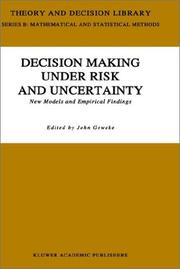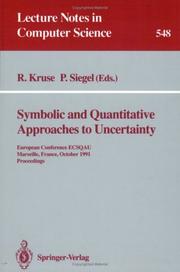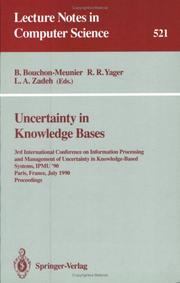| Listing 1 - 6 of 6 |
Sort by
|
Book
ISBN: 0226555593 9780226555591 Year: 1982 Volume: 32 Publisher: Chicago: University of Chicago press,
Abstract | Keywords | Export | Availability | Bookmark
 Loading...
Loading...Choose an application
- Reference Manager
- EndNote
- RefWorks (Direct export to RefWorks)

ISBN: 0792319044 9401052611 9401128383 Year: 1992 Volume: 22 Publisher: Dordrecht : Kluwer academic,
Abstract | Keywords | Export | Availability | Bookmark
 Loading...
Loading...Choose an application
- Reference Manager
- EndNote
- RefWorks (Direct export to RefWorks)
Decision making --- Risk --- Uncertainty (Information theory) --- Prise de décision --- Incertitude (Théorie de l'information) --- Mathematical models --- Congresses --- Modèles mathématiques --- Congrès --- Congresses. --- Prise de décision --- Incertitude (Théorie de l'information) --- Modèles mathématiques --- Congrès --- Decision-making - Mathematical models - Congresses. --- Risk - Mathematical models - Congresses. --- Uncertainty (Information theory) - Congresses.

ISBN: 3540546596 0387546596 3540464263 Year: 1991 Volume: vol 548 vol *57 Publisher: Berlin New York Springer-Verlag
Abstract | Keywords | Export | Availability | Bookmark
 Loading...
Loading...Choose an application
- Reference Manager
- EndNote
- RefWorks (Direct export to RefWorks)
A variety of formalisms have been developed to address such aspects of handling imperfect knowledge as uncertainty, vagueness, imprecision, incompleteness, and partial inconsistency. Some of the most familiar approaches in this research field are nonmonotonic logics, modal logics, probability theory (Bayesian and non-Bayesian), belief function theory, and fuzzy sets and possibility theory. ESPRIT Basic Research Action 3085, entitled Defeasible Reasoning and Uncertainty Management Systems (DRUMS), aims to contribute to the elucidation of similarities and differences between these formalisms. It consists of 11 active European research groups. The European Conference on Symbolic and Quantitative Approaches to Uncertainty (ESQAU) provides a forum for these groups to meet and discuss their scientific results. This volume contains 42 contributions accepted for the ESQAU meeting held in October 1991 in Marseille, together with 12 articles presenting the activities of the DRUMS groups and two invited presentations.
Uncertainty (Information theory) --- -681.3*I23 --- Congresses --- Deduction and theorem proving: answer/reason extraction; reasoning; resolution; metatheory; mathematical induction; logic programming (Artificial intelligence) --- Congresses. --- 681.3*I23 Deduction and theorem proving: answer/reason extraction; reasoning; resolution; metatheory; mathematical induction; logic programming (Artificial intelligence) --- 681.3*I23 --- Uncertainty (Information theory) - Congresses. --- Artificial intelligence. --- Coding theory. --- Artificial Intelligence. --- Coding and Information Theory. --- Data compression (Telecommunication) --- Digital electronics --- Information theory --- Machine theory --- Signal theory (Telecommunication) --- Computer programming --- AI (Artificial intelligence) --- Artificial thinking --- Electronic brains --- Intellectronics --- Intelligence, Artificial --- Intelligent machines --- Machine intelligence --- Thinking, Artificial --- Bionics --- Cognitive science --- Digital computer simulation --- Electronic data processing --- Logic machines --- Self-organizing systems --- Simulation methods --- Fifth generation computers --- Neural computers
Book
ISBN: 364211959X 9786612837395 3642119603 1282837397 Year: 2010 Publisher: Berlin : Springer,
Abstract | Keywords | Export | Availability | Bookmark
 Loading...
Loading...Choose an application
- Reference Manager
- EndNote
- RefWorks (Direct export to RefWorks)
Solving practical problems often requires the integration of information and knowledge from many different sources, taking into account uncertainty and impreciseness. Typical situations are, for instance, when we need to simultaneously process both measurement data and expert knowledge, where the former may be uncertain and inaccurate due to randomness or error in measurements whilst the latter are often vague and imprecise due to a lack of information or human’s subjective judgements. This gives rise to the demand for methods and techniques of managing and integrating various types of uncertainty within a coherent framework, so as to ultimately improve the solution to any such complex problem in practice. The 2010 International Symposium on Integrated Uncertainty Management and Applications (IUM’2010), which takes place at the Japan Advanced Institute of Science and Technology (JAIST), Ishikawa, Japan, between 9th–11thApril, is therefore conceived as a forum for the discussion and exchange of research results, ideas for and experience of application among researchers and practitioners involved with all aspects of uncertainty modelling and management.
Soft computing -- Congresses. --- Uncertainty -- Mathematical models -- Congresses. --- Uncertainty (Information theory) -- Congresses. --- Soft computing --- Uncertainty --- Uncertainty (Information theory) --- Computer Science --- Engineering & Applied Sciences --- Mathematical models --- Uncertainty. --- Engineering. --- Artificial intelligence. --- Computational intelligence. --- Computational Intelligence. --- Artificial Intelligence (incl. Robotics). --- Intelligence, Computational --- Artificial intelligence --- AI (Artificial intelligence) --- Artificial thinking --- Electronic brains --- Intellectronics --- Intelligence, Artificial --- Intelligent machines --- Machine intelligence --- Thinking, Artificial --- Bionics --- Cognitive science --- Digital computer simulation --- Electronic data processing --- Logic machines --- Machine theory --- Self-organizing systems --- Simulation methods --- Fifth generation computers --- Neural computers --- Construction --- Industrial arts --- Technology --- Reasoning --- Artificial Intelligence.
Book
ISBN: 1461424305 1489998667 9786613705389 1280794992 1461424313 Year: 2012 Publisher: New York : Springer,
Abstract | Keywords | Export | Availability | Bookmark
 Loading...
Loading...Choose an application
- Reference Manager
- EndNote
- RefWorks (Direct export to RefWorks)
Topics in Model Validation and Uncertainty Quantification, Volume 4, Proceedings of the 30th IMAC, A Conference and Exposition on Structural Dynamics, 2012, the fourth volume of six from the Conference, brings together 19 contributions to this important area of research and engineering. The collection presents early findings and case studies on fundamental and applied aspects of Structural Dynamics, including papers on: Robustness to Lack of Knowledge in Design Bayesian and Markov Chain Monte Carlo Methods Uncertainty Quantification Model Calibration.
Structural dynamics -- Congresses. --- Structural dynamics -- Mathematical models -- Congresses. --- Uncertainty (Information theory) -- Congresses. --- Chemical & Materials Engineering --- Civil & Environmental Engineering --- Engineering & Applied Sciences --- Mechanical Engineering --- Materials Science --- Civil Engineering --- Industrial & Management Engineering --- Technology - General --- Structural dynamics --- Engineering. --- Structural mechanics. --- Aerospace engineering. --- Astronautics. --- Quality control. --- Reliability. --- Industrial safety. --- Quality Control, Reliability, Safety and Risk. --- Aerospace Technology and Astronautics. --- Structural Mechanics. --- System safety. --- Mechanics. --- Mechanics, Applied. --- Solid Mechanics. --- Applied mechanics --- Engineering, Mechanical --- Engineering mathematics --- Classical mechanics --- Newtonian mechanics --- Physics --- Dynamics --- Quantum theory --- Space sciences --- Aeronautics --- Astrodynamics --- Space flight --- Space vehicles --- Safety, System --- Safety of systems --- Systems safety --- Accidents --- Industrial safety --- Systems engineering --- Prevention --- Aeronautical engineering --- Astronautics --- Engineering --- Industrial accidents --- Industries --- Job safety --- Occupational hazards, Prevention of --- Occupational health and safety --- Occupational safety and health --- Prevention of industrial accidents --- Prevention of occupational hazards --- Safety, Industrial --- Safety engineering --- Safety measures --- Safety of workers --- System safety --- Dependability --- Trustworthiness --- Conduct of life --- Factory management --- Industrial engineering --- Reliability (Engineering) --- Sampling (Statistics) --- Standardization --- Quality assurance --- Quality of products

ISBN: 3540543465 0387543465 354047580X Year: 1991 Volume: vol 521 Publisher: Berlin New York Springer-Verlag
Abstract | Keywords | Export | Availability | Bookmark
 Loading...
Loading...Choose an application
- Reference Manager
- EndNote
- RefWorks (Direct export to RefWorks)
The management and processing of uncertain information has shown itself to be a crucial issue in the development of intelligent systems, beginning withits appearance in the such systems as Mycin and Prospector. The papers in this volume reflect the current range of interests or researchers in thefield. Currently, the major approaches to uncertainty include fuzzy set theory, probabilistic methods, mathematical theory of evidence, non-standardlogics such as default reasoning, and possibility theory. The initial part of the volume is devoted to papers dealing with the foundations of these approaches, where recent attempts have been made to develop systems combining multiple approaches. A significant part of the book looks at the management of uncertainty in a number of the paradigmatic domainsof intelligent systems such as expert systems, decision making, databases, image processing, and reasoning networks. The papers are extended versions of presentations at the third international conference on information processing and management of uncertainty in knowledge-based systems. The proceedings of the two preceding IPMU conferences appear as LNCS 286 and LNCS 313.
Database management --- Uncertainty (Information theory) --- -681.3*C3 --- 681.3*H11 --- 681.3*H4 --- 681.3*I2 --- Congresses. --- Congresses --- Special-purpose and application-based systems: microprocessor/microcomputer; process control-, real-time, signal processing systems (Computer systems organization)--See also {681.3*J7} --- Systems and information theory: value of information--See also {681.3*E4} --- Information systems applications (GIS etc.) --- Artificial intelligence. AI --- 681.3*I2 Artificial intelligence. AI --- 681.3*H4 Information systems applications (GIS etc.) --- 681.3*H11 Systems and information theory: value of information--See also {681.3*E4} --- 681.3*C3 Special-purpose and application-based systems: microprocessor/microcomputer; process control-, real-time, signal processing systems (Computer systems organization)--See also {681.3*J7} --- 681.3*C3 --- Uncertainty (Information theory) - Congresses. --- Data base management - Congresses. --- Artificial intelligence. --- Mathematics. --- Computer science. --- Distribution (Probability theory. --- Statistics. --- Artificial Intelligence. --- Applications of Mathematics. --- Information Systems Applications (incl. Internet). --- Models and Principles. --- Probability Theory and Stochastic Processes. --- Statistics, general. --- Statistical analysis --- Statistical data --- Statistical methods --- Statistical science --- Mathematics --- Econometrics --- Distribution functions --- Frequency distribution --- Characteristic functions --- Probabilities --- Informatics --- Science --- Math --- AI (Artificial intelligence) --- Artificial thinking --- Electronic brains --- Intellectronics --- Intelligence, Artificial --- Intelligent machines --- Machine intelligence --- Thinking, Artificial --- Bionics --- Cognitive science --- Digital computer simulation --- Electronic data processing --- Logic machines --- Machine theory --- Self-organizing systems --- Simulation methods --- Fifth generation computers --- Neural computers
| Listing 1 - 6 of 6 |
Sort by
|

 Search
Search Feedback
Feedback About UniCat
About UniCat  Help
Help News
News